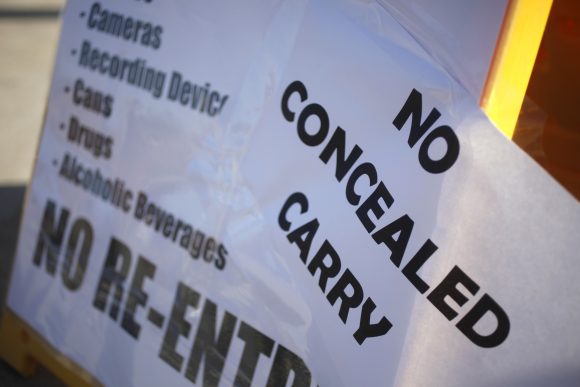
A sign outside Welcomefest on Aug. 25 prohibiting concealed weapons. (CU Independent/Robert R. Denton)
Students at the University of Colorado’s Boulder and Colorado Springs campuses don’t agree on whether or not to ban concealed carry.
Surveys conducted by the CU Independent and The Scribe suggest CU Boulder students are far more likely to support a ban against carrying a concealed firearm on campus, while a slimmer majority of UCCS students don’t support such an effort.
Campus concealed carry has been a controversial issue for CU students for decades, but it reemerged in public discourse after a shooting at UCCS in February left two people dead and efforts to ban campus carry were introduced at the Colorado Capitol and CU’s Board of Regents earlier this year.
The surveys, which have vastly different sample sizes and distribution methods, are unscientific.
How we collected our data
The CU Boulder survey was distributed through the CU Independent’s social media, newsletter, website and other student group partners. It collected 77 responses over eight days.
The UCCS survey was distributed in a university-wide email to all students at that campus. It collected 1198 responses over seven days.
Who responded?
The majority of respondents to both surveys self-identified as undergraduate juniors or seniors. The UCCS survey saw an additional 196 graduate students fill out the survey and 14 undergraduate freshmen took the smaller CU Boulder survey. Doctoral candidates represented the lowest number of respondents for UCCS, while graduate students had the lowest response rate at CU Boulder.
At CU Boulder, the number of people who took the survey and said they own a firearm or have a concealed carry permit was significantly lower than those who said they don’t. At UCCS, those numbers were closer together. Some 19% of UCCS respondents said they had a concealed carry permit, while 48% of UCCS respondents said they own a firearm.
Support for a concealed carry ban
At public meetings at the state capitol and in front of the Board of Regents, students speaking in support of a ban on concealed carry have outnumbered students speaking in opposition.
At CU Boulder, more than 70% of survey respondents said they either strongly or somewhat supported a ban on concealed carry. The campus is in an overwhelmingly liberal county and its student government leaders have predominantly led the charge against concealed carry in recent years.
“This is a tough one for me. Generally, I support concealed and open carry everywhere,” one CU Boulder student wrote in response to the survey. “But it’s tricky in a school environment.”
About 56% of UCCS respondents said they somewhat or strongly opposed a ban on concealed carry, while 40% said they somewhat or strongly supported such an attempt. El Paso County, home to UCCS, is more conservative than Boulder and the campus attracts a larger number of nontraditional students (more than 20% of the campus population has some connection to the U.S. military.)
“We shouldn't have to study in fear. We have a good law enforcement presence on campus to protect us. There is zero reason for students or staff to carry guns on campus,” a UCCS student who supports a concealed carry ban wrote in response to the survey.
Those divides remain largely unchanged in other parts of the survey. A slim majority of UCCS students (about 54%) said they felt very or somewhat safe with other students or community members having a handgun on campus. About 74% of CU Boulder students said they felt very or somewhat unsafe in response to the same question.
The double homicide at UCCS on Feb. 16 has inspired a wave of gun control activism on that campus. The man arrested for the murders allegedly killed his roommate and another woman in a university residential apartment that allows students to keep a registered handgun in a room. He did not register any weapons with the university.
About 57% of respondents at UCCS said they believed it was very or somewhat likely someone with a concealed carry firearm on campus could prevent a “violent act.” Some 37% said they believed the opposite.
“The likelihood of an individual with a concealed carry permit stopping a violent act is small considering the size of the campus. However, banning concealed carry will not prevent or hinder in any way an individual with violent intentions from openly bringing weapons to campus and using them,” one UCCS student wrote in response to the survey.
“As long as they are trained and licensed, I think [concealed carry permit holders] are beneficial and could prevent a catastrophic event should such an incident occur,” another UCCS student wrote.
At CU Boulder, 64% of respondents said someone with a concealed firearm was somewhat or very unlikely to stop a violent act. About a quarter of other respondents believed such a person would be more likely to prevent a violent act.
“Increasing the number of guns on campus really only increases the chance of someone getting hurt by the weapons. Accidents happen. Chances of mishandling, emotional moments and general stressors are at a high on a university campus,” a CU Boulder student wrote.
National scientific studies on this particular subject tend to suggest whether or not a college allows concealed carry has little impact on that campus’s overall crime rates.
Last week, CU Regent Wanda James formally introduced a motion that triggered a months-long process to change regent policy and no longer allow concealed carry on any of the university’s four campuses. The outcome of that process is uncertain and could stretch well into the summer.
On Wednesday, the bill at the state capitol that would ban concealed carry in several public spaces, including universities, cleared another hurdle as it advanced passed the state House Judiciary Committee on an 8-3 vote. It now heads to the appropriations committee, where legislators will take up more debate on the bill in the coming weeks.
Contact CU Independent Special Investigations Editor Henry Larson at henry.larson@colorado.edu.
